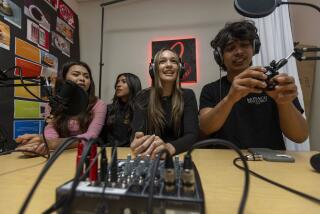Imagine What Creativity Can Do for Class Reports
- Share via
Chess might not seem like an exciting topic for a research paper. But when the king talks to the players and explains what’s happening on the board, it’s an attention grabber.
That’s just the response Robert Wu and Brandon Fong, both 10, were aiming for with their fifth-grade project at Rossmoor Elementary School.
With multimedia software and help from school computer specialist Sandee Welsh, the youngsters developed a project that includes audio and animation, all done humorously on a computer screen.
“It’s another way of writing a report,” Robert said.
But that extra touch of creativity is what teachers say makes a report stand out and ensures a top grade on a semester project.
“They have to get my attention,” said Cathy Frazier, who teaches eighth-grade English and art at Talbert Middle School in Fountain Valley. “There has to be a buy-in. That is their main job: to entertain me.”
Computer savvy is not a requirement, teachers say. Frazier suggests lively writing, particularly in the opening of a report, along with personal anecdotes, interesting quotations, descriptions of sights, sounds and even aromas that put the reader in the scene.
For an oral report on Edgar Allan Poe, students in Frazier’s class made real estate advertisements for the infamous House of Usher, subject of a short story by the American author.
(Buyers, beware: The house burns down in the macabre tale.)
Another way to liven up an oral report is to make puppets that tell the story or to dress as a famous person in history and describe an event from his or her perspective.
RJ Gordon Shephard, 10, made hand puppets of U.S. presidents for a presentation at Serra Catholic Elementary School in Rancho Santa Margarita.
“I dressed John Adams in a suit with a tail coat and lace ascot and cotton hair,” said RJ, who is in fifth grade. “And I put keys into his hands with a piece of chain because he was the first president to live in the White House.”
For former President Gerald Ford, “I dressed him as a Boy Scout and used a piece of cloth, like regular tablecloth, for a scarf because that’s what the Boy Scouts wear,” said RJ, who was inspired by Ford’s having been an Eagle Scout.
Another possibility is to interview experts, much as a newspaper reporter does to write a story. For a book review, for instance, the student might try to get in touch with the author.
“These folks are approachable,” said Christine Baron, an English teacher at Fountain Valley High School. Some of her students have interviewed writers and publishers to get quotes for term papers, she said.
Business leaders and public officials are another source of information for students, as are citizens who have lived through historic events. A baby boomer who danced at Woodstock or saw the Doors in concert might contribute to a report on the 1960s. A military veteran who fought in the Battle of the Bulge might share recollections for a paper on World War II.
Senior centers are a good place to start interviewing people for perspective on the earlier years of the 20th century. Searching the Internet for special-interest sites might lead to contacts who could be interviewed by e-mail.
At Masuda Middle School in Fountain Valley, teacher Melinda Smith’s students read a fictionalized account of life in a street gang. For their report on the assignment, they interviewed local police officers with knowledge of the topic.
“They were excited about going out to ... their communities and speaking to people who knew what they were writing about,” Smith said. “It made it more meaningful for them.”
(BEGIN TEXT OF INFOBOX / INFOGRAPHIC)
Special Reports
Veteran teachers offer these 10 tips to enrich school papers and projects:
* Interview an expert or witness to historical events.
* Write about topics that interest you.
* Make references to current events.
* Create presentations on computer disk or CD-ROM.
* Add graphics, audio and moving images.
* Search the Internet, remembering to scrutinize material for inaccuracies and bias.
* Use local resources such as college libraries and city records.
* Ask university instructors for suggestions.
* For oral reports, dress in period clothing and tell the story from the perspective of a famous person.
* Make puppets, and use them to present your report.
Researched by John Canalis / For The Times


